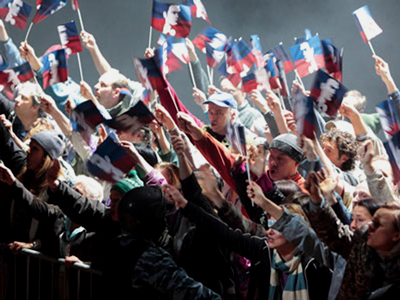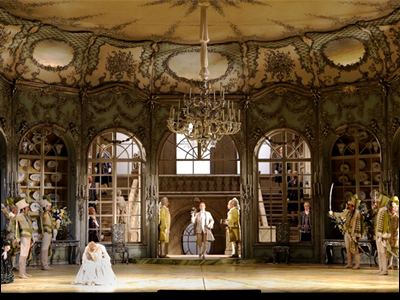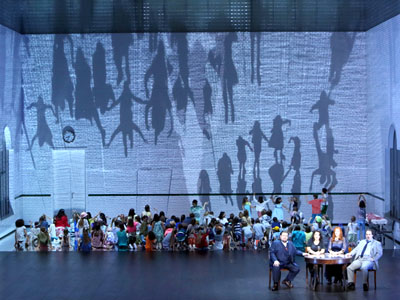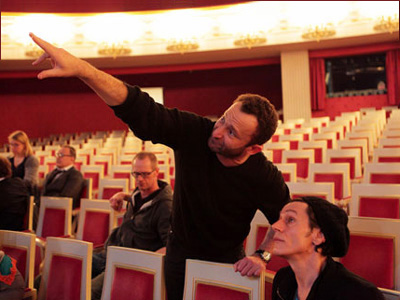
By ANDREW POWELL
Published: June 6, 2015
MUNICH — After the genetic mismatch of Kirill Petrenko and Gaetano Donizetti here, it was a relief to watch the conductor easily navigate and ignite the tone rows of Lulu last week (May 25 and 29) at the National Theater. Happily he did so using Cerha’s reconstitution of Act III and supported by an eloquent, virtuosic Bavarian State Orchestra, now truly his orchestra twenty months beyond the systemic jolt of the handover from Kent Nagano.
The GMD conveyed the differing compositional powers of each act almost entirely through soft, finely balanced ensemble, favoring transparency. Where the music rose dynamically, as in his ardent account of the palindromic Act II Zwischenspiel or the pithy societal interjections of the Paris scene, its contours and colors palpably stunned the capacity audience.
For these reasons alone these were luxurious traversals of Berg’s stimulating, exacting, 185-minute score. They revolved, though, not around Petrenko but upon the musicianship of the charming and beautiful Marlis Petersen, 47, who drew rapturous applause at evening’s end.
Meek early on, she sang out fully in the anti-heroine’s Act I duettino with the Painter (Rainer Trost on vivid form) and gauged her sound with Lied-art intelligence — but a diva’s command of the stage — from that point forward. The bright firm voice sailed into the house with greater body of tone than many a Lulu, shaded emotionally and locked into Berg’s text.
Having first essayed the role sixteen years ago in Kassel, Petersen has developed crisp, moving inflections for its unaccompanied dialog and Sprechstimme, and on these nights she fashioned from every last morsel the composer provides a gutsy, honest, amusing, vulnerable and above all integrated portrayal.
Daniela Sindram had a harder time making an impact as the pivotal Gräfin Geschwitz in this new production. In fact the mezzo barely stood out at all because director Dmitri Tcherniakov (pictured with the soprano) put her in pants, muting her sexuality and defeating the counterforce Berg intended to the men around Lulu. (Has Tcherniakov only this narrow grasp of what it means to be a lesbian?)
But she sang expressively, with a golden, even timbre, purity of line and good diction, and she capped her interrupted London monologue with a ravishing Lulu! Mein Engel! That last outpouring endured the distraction of Lulu’s death on stage, contrary to Berg’s plan, and so the drama ended out of kilter as the tempos slowed, and anticlimactic.
Lyric tenor Matthias Klink introduced a sweet-toned Alwa whose volume lessened in high-lying phrases. Bo Skovhus, as his father and Lulu’s lethal client, made a perfect foil for Petersen, magnetic of gesture and clever in pointing the text, even if his tenorial baritone lacked ideal resonance. In the supporting roles, besides Trost, Wolfgang Ablinger-Sperrhacke’s mellifluous turn as the Marquis stood out.
Like most productions at Bavarian State Opera nowadays, this Lulu will look its best through camera lenses rather than from a seat in the theater. Tcherniakov sets all scenes in one static grove of glass panels, much as he locked us in a gray seminar room for his last work here, Simon Boccanegra. Glass of course is an upgrade: it affords depth, allows vivid use of light and overcomes staging challenges, such as when characters scenically snoop. But only the panning and zooming of cameras can make up for missing spectacle in this case.
During Berg’s several Zwischenspiele — intended for scene changes tracing Lulu’s progress and retrogression — the director populates the background panels with stiffly animated mimes, like mannequins in shop windows. Perversely, given today’s common use of projections, he offers no film for the Filmmusik, but a roving spotlight signals its crucial midpoint.
Placement of the panels forces most of the crowd in the Paris scene behind glass, and Tcherniakov drably lines everyone up in a row. Otherwise he strongly shapes and moves the individual characters and, with the one misstep of Geschwitz’s costuming, engages the viewer convincingly, avoiding cliché and graphic violence.
Today’s performance of Lulu, the fourth in a run of five, streams live at noon, New York time, at www.staatsoper.de/tv. (Although named “Staatsoper.TV,” the service is not accessed at that domain.) Three performances are scheduled for September, when Petrenko hands over to Cornelius Meister.
Photo © Wilfried Hösl
Related posts:
Benjamin and Aimard
U.S. Orchestras on Travel Ban
Mastersingers’ Depression
Netrebko, Barcellona in Aida
Pintscher Conducts New Music





Portraits For a Theater
Sunday, October 13th, 2013By ANDREW POWELL
Published: October 13, 2013
MUNICH — Next Wednesday (Oct. 16) new portraits go on display in Bavarian State Opera’s lobby. Twenty-one new portraits.
Astrid Varnay, Dietrich Fischer-Dieskau, Kurt Moll, Brigitte Fassbaender, Lucia Popp, Edita Gruberová, René Kollo, Hildegard Behrens and Waltraud Meier are among the worthy singing subjects, company troopers all.
But theatergoers expecting traditional oils on canvas in pretty frames may be in for a shock.
The new dauerhaft pieces embrace painting, drawing, tapestry, photography, hot wax, and at least one video requiring its own flat-panel display, to be hung in a hall that once serenely separated our electronic world from the madness on stage.
To create space in the company’s 114-year-old portrait collection, fifteen tired canvasses recently disappeared into das Lager des Theatermuseums, a.k.a. deep storage, leaving bare walls.
Safe, at least for now, are well-varnished depictions of such epoch-defining Munich musicians as Heinrich Vogl and Therese Thoma, Wagner’s first Loge (1869) and first Sieglinde (1870).
But 21 new faces? The growth spurt — involving the same number of visual artists and two years’ gestation — is intended to correct a lull. Apparently only conductor Wolfgang Sawallisch and impresario Peter Jonas have been added to the collection since the 1960s.
And it serves another purpose. Fifty years have passed since Bavarian State Opera resumed operations at Munich’s National Theater, on Nov. 21, 1963, long after the house was cratered by Allied bombs. Rebuilding cost: 60 million Deutschmarks, or thereabouts.
Friends of the company (Freunde des Nationaltheaters München e.V.) wanted to seize the occasion to acknowledge the work of singers in each subsequent decade.
The result is portrait commissions that are a little front-loaded. Hermann Prey, for instance, who sang leading roles starting in the 1960s, is honored alongside salad-green contributors such as Klaus Florian Vogt, who began in the 2000s and may or may not prove to be a singer of lasting artistry.
At any rate, the collection is made current, and presumably hipper, by this large initiative.
Other subjects of the commissions include Munich favorites Margaret Price, Júlia Várady, Wolfgang Brendel and the still-active, though wobbly, Peter Seiffert.
An odd choice is Fritz Wunderlich, the honey-toned Mozart tenor who died young. He went through the company’s apprentice program before the house reopened, but then bolted for a career contract in rival Vienna.
Today’s singers in the lineup, besides Vogt, are Anja Harteros, Diana Damrau, Jonas Kaufmann, Christian Gerhaher and Wolfgang Koch.
Administrative enthusiasm and the sheer scale of the effort have led to at least one creaky assignment, its outcome already made public, that for Damrau. The soprano gets photography-based treatment that manages to degrade and marginalize her without giving the viewer a sense of who she is.
With luck, this will be the qualitative exception.
Bronze busts of the company’s music directors, meanwhile, comprise another facet of the theater’s art. At present this series is complete through Zubin Mehta, who left in 2006.
As it happens, a new Generalmusikdirektor, Kirill Petrenko, took over last month on a five-year contract, and so the just-departed Kent Nagano will likely soon be commemorated in three-dimensional metal.
Print and online material related to the company’s 2013–14 season, not incidentally, showcases black-and-white photographs of the bombed-out house as well as 1963 crowds after the reopening.
Soberly its slogan taps Nietzsche: Wie man wird, was man ist.
How One Becomes What One Is — a smooth segue to a bleaker side of the retrospective. Official research has at last begun into correspondence between the Nazi Party and two former Bavarian State Opera GMDs, Richard Strauss (tenure 1894–1896) and Clemens Krauss (1937–1944).
Petrenko, looking forward, gives his first concert next month, a freebie with Nina Stemme, Kaufmann, and the virtuosic Bavarian State Orchestra.
A few days later, on the anniversary itself, he leads a new staging of Die Frau ohne Schatten, the opera that reopened the National Theater under GMD Joseph Keilberth one day before Kennedy was shot.
Some of Petrenko’s initial work will be streamed at www.staatsoper.de/tv: Die Frau ohne Schatten (directed by Krzysztof Warlikowski) on Dec. 1; La clemenza di Tito (Jan Bosse) on Feb. 15, 2014; and Die Soldaten (Andreas Kriegenburg) on May 31.
Here’s hoping the new portraits, in the aggregate, adequately reflect the virtues of this remarkable institution!
Photo © Wilfried Hösl
Related posts:
In Your Face, Astrid
Petrenko Preps Strauss Epic
Flitting Thru Prokofiev
Ettinger Drives Aida
Petrenko to Extend in Munich
Tags:Anja Harteros, Astrid Varnay, Bavarian State Opera, Bavarian State Orchestra, Bayerische Staatsoper, Bayerisches Staatsorchester, Brigitte Fassbaender, Christian Gerhaher, Clemens Krauss, Commentary, Diana Damrau, Die Frau ohne Schatten, Dietrich Fischer-Dieskau, Edita Gruberová, Fritz Wunderlich, Heinrich Vogl, Hermann Prey, Hildegard Behrens, Joseph Keilberth, Júlia Várady, Kaufmann, Kent Nagano, Kirill Petrenko, Klaus Florian Vogt, Kurt Moll, Lucia Popp, Margaret Price, München, Munich, National Theater, Nationaltheater, News, Nina Stemme, Peter Jonas, Peter Seiffert, René Kollo, Richard Strauss, Therese Vogl, Waltraud Meier, Wolfgang Brendel, Wolfgang Koch, Wolfgang Sawallisch, Zubin Mehta
Posted in Munich Times | Comments Closed